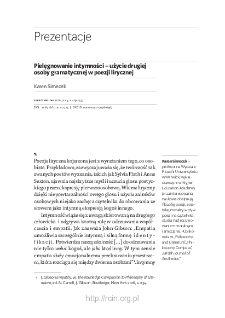- Search in all Repository
- Literature and maps
- Archeology
- Mills database
- Natural sciences
Advanced search
Advanced search
Advanced search
Advanced search
Advanced search

Object
Title: Pielęgnowanie intymności – użycie drugiej osoby gramatycznej w poezji lirycznej
Subtitle:
Publisher:
Place of publishing:
Description:
21 cm ; Pol. text, eng. summary
References:
1. Camp E., Two varieties of literary imagination: metaphor, fiction, and thought experiments, “Midwest Studies in Philosophy” 2009, t. 33, s. 107-130.
https://doi.org/10.1111/j.1475-4975.2009.00186.x
2. Camp, E., Why metaphors make good insults: perspectives, presupposition, and pragmatics, “Philosophical Studies” 2017, nr 174, s. 47-64.
https://doi.org/10.1007/s11098-015-0525-y
3. Cohen T., Metaphor and the cultivation of intimacy, “Critical Inquiry” 1978, t. 5, nr 1, 3-12.
https://doi.org/10.1086/447969
4. Constantine D., Poetry, Oxford University Press, Oxford 2013.
5. Darwall S., The Second-person standpoint: morality, respect, and accountability, Harvard University Press, Cambridge MA 2006.
6. Eilan N., The you turn, “Philosophical Explorations” 2014, t. 17, nr 3. s. 265-278.
https://doi.org/10.1080/13869795.2014.941910
7. Gibson J., Empathy, w: The Routledge Companion to Philosophy of Literature, red. N. Carroll, J. Gibson, Routledge, New York 2016, s.234-246.
https://doi.org/10.4324/9781315708935-20
8. Helm B., Emotional reason: deliberation, motivation and the nature of value, Cambridge University Press, Cambridge 2007.
9. Helm B., Love, Friendship and the self: intimacy, identification and the social nature of persons, Oxford University Press, Oxford 2012.
10. Iser W., The act of reading, Routledge, Londyn 1978.
11. John, E., Poetry and directions for thought, “Philosophy and Literature” 2013, t. 37, nr 2, s. 451-471.
https://doi.org/10.1353/phl.2013.0029
12. Jollimore T., ‘Like a picture or a bump on the head’: vision, cognition, and the language of poetry, “Midwest Studies in Philosophy” 2009, t. 33, s. 131-158.
https://doi.org/10.1111/j.1475-4975.2009.00187.x
13. Lamarque P., The elusiveness of poetic meaning, “Ratio” 2009, nr 22, s. 398-420.
https://doi.org/10.1111/j.1467-9329.2009.00442.x
14. Longworth G., You and me, “Philosophical Explorations” 2014, t. 17, nr 3, 289-303.
https://doi.org/10.1080/13869795.2014.941908
15. Olson Ch., Projective verse, w: Collected prose, red. D. Allen, B. Friedlander, University of California Press, Berkeley 1997.
16. Pinsky R., Democracy, culture and the voice of poetry, Princeton University Press, Princeton 2002.
17. Rankine C., Obywatel [Citizen: an American lyric], Graywolf Press, Minneapolis 2014.
18. Ribeiro A. Ch., Toward a philosophy of poetry, “Midwest Studies in Philosophy” 2009, nr 33, s. 61-77.
https://doi.org/10.1111/j.1475-4975.2009.00185.x
19. Rosenblatt L. M., Literature as exploration, MLA, Nowy Jork 1983, wyd. III.
20. Schwartz A., On being seen: an interview with Claudia Rankine from Ferguson, “New Yorker”, 22.08. 2014.
21. Simecek K., Beyond narrative: poetry, emotion and the perspectival View, "British Journal of Aesthetics 2015, t. 55, nr 4, s. 497-513.
https://doi.org/10.1093/aesthj/ayv041
22. Vendler H., Invisible listeners: lyric intimacy in Herbert, Whitman, and Ashbery, Princeton University Press, Princeton 2005.
23. Walton K., In other shoes: music, metaphor, empathy, existence, Oxford University Press, Oxford 2015.
24. Zamir T., Unethical acts, “Philosophical Quarterly” 2012, t. 63 nr 251, s. 353-373.
https://doi.org/10.1111/1467-9213.12038
Relation:
Issue:
Start page:
End page:
Detailed Resource Type:
Resource Identifier:
oai:rcin.org.pl:209686 ; 0867-0633 ; 10.18318/td.2020.5.25
Source:
IBL PAN, call no. P.I.2524 ; click here to follow the link
Language:
Language of abstract:
Rights:
Creative Commons Attribution BY 4.0 license
Terms of use:
Copyright-protected material. [CC BY 4.0] May be used within the scope specified in Creative Commons Attribution BY 4.0 license, full text available at: ; -
Digitizing institution:
Institute of Literary Research of the Polish Academy of Sciences
Original in:
Library of the Institute of Literary Research PAS
Projects co-financed by:
Access:
Object collections:
- Digital Repository of Scientific Institutes > Partners' collections > Institute of Literary Research PAS > Serials
- Digital Repository of Scientific Institutes > Literature > Journals/Articles
Last modified:
Sep 20, 2021
In our library since:
Sep 13, 2021
Number of object content downloads / hits:
169
All available object's versions:
https://rcin.org.pl./publication/246214
Show description in RDF format:
Show description in RDFa format:
Show description in OAI-PMH format:
| Edition name | Date |
|---|---|
| Simecek K. - Pielęgnowanie intymności – użycie drugiej osoby gramatycznej w poezji lirycznej | Sep 20, 2021 |
Objects Similar
Koziebrodzki, Józef.
Carpenter, Bogdana

 INSTYTUT ARCHEOLOGII I ETNOLOGII POLSKIEJ AKADEMII NAUK
INSTYTUT ARCHEOLOGII I ETNOLOGII POLSKIEJ AKADEMII NAUK
 INSTYTUT BADAŃ LITERACKICH POLSKIEJ AKADEMII NAUK
INSTYTUT BADAŃ LITERACKICH POLSKIEJ AKADEMII NAUK
 INSTYTUT BADAWCZY LEŚNICTWA
INSTYTUT BADAWCZY LEŚNICTWA
 INSTYTUT BIOLOGII DOŚWIADCZALNEJ IM. MARCELEGO NENCKIEGO POLSKIEJ AKADEMII NAUK
INSTYTUT BIOLOGII DOŚWIADCZALNEJ IM. MARCELEGO NENCKIEGO POLSKIEJ AKADEMII NAUK
 INSTYTUT BIOLOGII SSAKÓW POLSKIEJ AKADEMII NAUK
INSTYTUT BIOLOGII SSAKÓW POLSKIEJ AKADEMII NAUK
 INSTYTUT CHEMII FIZYCZNEJ PAN
INSTYTUT CHEMII FIZYCZNEJ PAN
 INSTYTUT CHEMII ORGANICZNEJ PAN
INSTYTUT CHEMII ORGANICZNEJ PAN
 INSTYTUT FILOZOFII I SOCJOLOGII PAN
INSTYTUT FILOZOFII I SOCJOLOGII PAN
 INSTYTUT GEOGRAFII I PRZESTRZENNEGO ZAGOSPODAROWANIA PAN
INSTYTUT GEOGRAFII I PRZESTRZENNEGO ZAGOSPODAROWANIA PAN
 INSTYTUT HISTORII im. TADEUSZA MANTEUFFLA POLSKIEJ AKADEMII NAUK
INSTYTUT HISTORII im. TADEUSZA MANTEUFFLA POLSKIEJ AKADEMII NAUK
 INSTYTUT JĘZYKA POLSKIEGO POLSKIEJ AKADEMII NAUK
INSTYTUT JĘZYKA POLSKIEGO POLSKIEJ AKADEMII NAUK
 INSTYTUT MATEMATYCZNY PAN
INSTYTUT MATEMATYCZNY PAN
 INSTYTUT MEDYCYNY DOŚWIADCZALNEJ I KLINICZNEJ IM.MIROSŁAWA MOSSAKOWSKIEGO POLSKIEJ AKADEMII NAUK
INSTYTUT MEDYCYNY DOŚWIADCZALNEJ I KLINICZNEJ IM.MIROSŁAWA MOSSAKOWSKIEGO POLSKIEJ AKADEMII NAUK
 INSTYTUT PODSTAWOWYCH PROBLEMÓW TECHNIKI PAN
INSTYTUT PODSTAWOWYCH PROBLEMÓW TECHNIKI PAN
 INSTYTUT SLAWISTYKI PAN
INSTYTUT SLAWISTYKI PAN
 SIEĆ BADAWCZA ŁUKASIEWICZ - INSTYTUT TECHNOLOGII MATERIAŁÓW ELEKTRONICZNYCH
SIEĆ BADAWCZA ŁUKASIEWICZ - INSTYTUT TECHNOLOGII MATERIAŁÓW ELEKTRONICZNYCH
 MUZEUM I INSTYTUT ZOOLOGII POLSKIEJ AKADEMII NAUK
MUZEUM I INSTYTUT ZOOLOGII POLSKIEJ AKADEMII NAUK
 INSTYTUT BADAŃ SYSTEMOWYCH PAN
INSTYTUT BADAŃ SYSTEMOWYCH PAN
 INSTYTUT BOTANIKI IM. WŁADYSŁAWA SZAFERA POLSKIEJ AKADEMII NAUK
INSTYTUT BOTANIKI IM. WŁADYSŁAWA SZAFERA POLSKIEJ AKADEMII NAUK


































